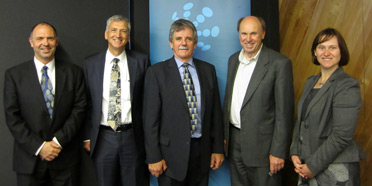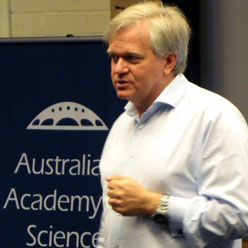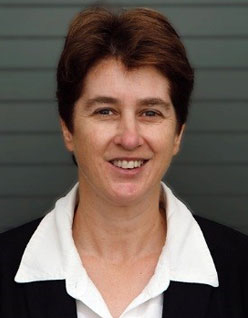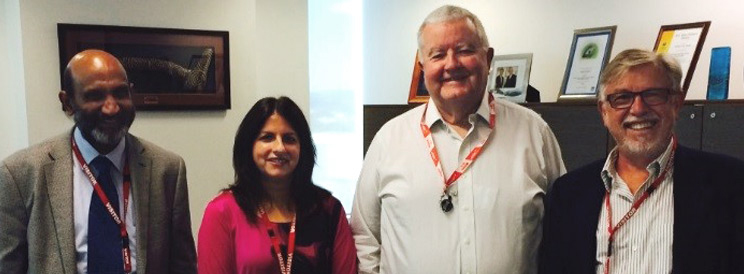The Academy’s National Committees for Science seek input from across government, industry, academia and the education sector to identify the future needs of disciplines and outline priorities for investment over the next 10 years. The Academy received funding from the Australian Research Council under the Learned Academies Special Projects scheme to develop plans for chemistry; agriculture, fisheries and food; and Earth sciences.

The National Committee for Chemistry held more than 25 town hall meetings around Australia in late 2014 to discuss research directions, infrastructure, workforce needs, career structure and education. In November 2014, the committee also organised a breakfast to engage with industry in a partnership with the BioMelbourne Network. The meeting was an important step to bring industry and academia closer together and discuss the needs for chemistry. The event included an expert panel to share their views on the existing capabilities, current challenges and opportunities to build the global competitiveness of chemistry in Australia for the future. More information about the Chemistry Decadal Plan
The National Committee for Agriculture, Fisheries and Food is developing a working document to identify major scientific opportunities to ensure Australian agriculture can respond to the major challenges it will face in the next 10 years. Agriculture is central to food security and contributes significantly to the economy in Australia.
The National Committee for Earth Sciences is also developing a working document to ensure that the plan impacts positively on Australian life. Improved research outcomes, better training and stronger engagement with industry will have a direct impact on the economy, health and wellbeing of Australia.
The exposure draft of the Mathematical Sciences Decadal Plan is being promoted at presentations nationally, with comment on the draft document being sought during February and March from the community, external stakeholders, committee members and the Academy Council. More information on the National Committee for Mathematical Sciences

The National Committee for Astronomy released in January an exposure draft of the Decadal Plan for Australian Astronomy 2016-2025 for comment. The draft document synthesised recommendations from 11 working groups across all areas of astronomical science, facilities and instrumentation, education, and industry engagement. The committee then held a series of presentations and discussions around Australia during February to publicise the decadal plan as widely as possible and to seek feedback and broad endorsement for its recommendations from the astronomy community.
The committee recently received a report on the progress of the Australian Square Kilometre Array (SKA) from SKA director Dr Brian Boyle, including a discussion to help inform the context for the finalisation of the decadal plan.
In November, current and past members of the National Committee for Brain and Mind and representatives of the Psychology Foundation and Departments met with the CEO of the Australian Research Council (ARC), Professor Aidan Byrne, to discuss concerns about the ARC’s new Medical Research Guidelines.
The primary concern was that the new guidelines could result in research on basic brain and psychological processes being no longer eligible for ARC funding. Issues relating to research proposals that included abnormal cases or groups, or involved psychology interventions, were also discussed. It was agreed that such proposals would still be eligible for ARC funding and the ARC confirmed it is committed to ensuring there is no eligibility gap between ARC and National Health and Medical Research Council (NHMRC). Invitations were issued to submit additional FAQ items if it was felt necessary to clarify areas of ambiguity.
The National Committee for Data in Science has made a submission to a report on the status of national eResearch infrastructure in Australia, funded under the Department of Education’s National Collaborative Research Infrastructure Strategy (NCRIS). The Report on the Status of the NCRIS eResearch Capability is due to be released in the first quarter of 2015. Read the committee’s submission
Members of the committee, including the Chair and Deputy Chair, attended the International Conference on Data Sharing and Integration for Global Sustainability, SciDataCon 2014, in New Delhi in November. The conference focused on global data sharing and management developments related to the themes of dynamic planet, global development, transformations towards sustainability, and data science and services. Following the conference, meetings were held by the ICSU World Data System Scientific Committee and the 2014 CODATA General Assembly, which saw the election of a new CODATA President. Professor Lesley Wyborn represented Australia as the Academy voting delegate.

The National Committee for Earth System Science organised a successful Third Australian Earth System Outlook Conference in December. More about the conference.
Committee member Dr Helen Cleugh has been accepted as a member of the World Climate Research Program Joint Scientific Committee. Dr Cleugh is Deputy Director, Oceans and Atmosphere at CSIRO, and will join the WCRP Joint Scientific Committee from 2015-18.
The Future Earth Secretariat will list the committee as the Australian contact point for Future Earth. The Australian Council of Learned Academies has agreed to fund the Academy to lead the development of a national position regarding participation in this important global initiative and an Australian Future Earth Committee may emerge from this.
Professors Rod Tucker FAA and Shazia Sadiq, Chair and Deputy Chair of the National Committee for Information and Communication Sciences, met with the Australia’s Chief Scientist in February to find out how the committee can help to advance information and communication sciences in Australia and support the national STEM agenda. They were accompanied by Academy Secretary Physical Sciences Professor C. Jagadish FAA FTSE, and Dr Chris Hatherly, Director of Science Policy and Projects.
The wide-ranging discussion covered topics including prioritisation of information and communication sciences research areas, the central role information and communication sciences can play in research and innovation, computing education in Australia, and the need for long-term strategic planning in all of these areas. The issues discussed in the meeting will contribute to the committee’s strategic planning.
 Left to right: Professor C. Jagadish, Professor Shazia Sadiq, Chief Scientist Professor Ian Chubb, and Professor Rod Tucker
Left to right: Professor C. Jagadish, Professor Shazia Sadiq, Chief Scientist Professor Ian Chubb, and Professor Rod TuckerThe National Committee for Mathematical Sciences has been considering the need for new approaches to mathematics education. As part of this work, the Academy, with the support of the Office of the Chief Scientist, hosted the Mathematics and Games Interactive Course (MAGIC) Forum in October. The event drew together 55 participants from every state and territory with a range of perspectives on mathematics teaching. They included mathematics teachers, academics with interests in education, officers of education departments and professional societies, and invited experts.
The Chief Scientist opened the forum, which achieved its aim of generating a wide ranging discussion on the development of new resources that address the disengagement of middle school students in mathematics by teaching mathematics that is enjoyable, interesting, relevant, rigorous, applicable, contemporary, and understandable in a 21st century context and learning mode.
While there were diverse opinions regarding what might be the most suitable approach, there was widespread agreement at the meeting that there should be further investigation. In this context the Department of Education and Training advised that it was anticipated that the tender for the development of ‘Mathematics by Inquiry’ programs announced as part of the STEM initiatives in its Industry, Innovation and Competitiveness Agenda would be let by the end of the financial year.
The National Committee for Nutrition co-sponsored a workshop with the Nutrition Society of Australia and the Australian Nutrition Trust Fund in November, focusing on the diversity of science content of nutrition science included in undergraduate courses.
Course coordinators outlined their respective degrees and what each course saw as key student attributes, resources that were utilised in the delivery of their program and career opportunities for graduating students. Coordinators formed working relationships which will support planning for future nutrition science programs, and examples of best practice at Australian institutions were shared. An important outcome of the workshop was an aim to establish consensus on what should constitute the core of a nutrition science unit or program.
© 2024 Australian Academy of Science